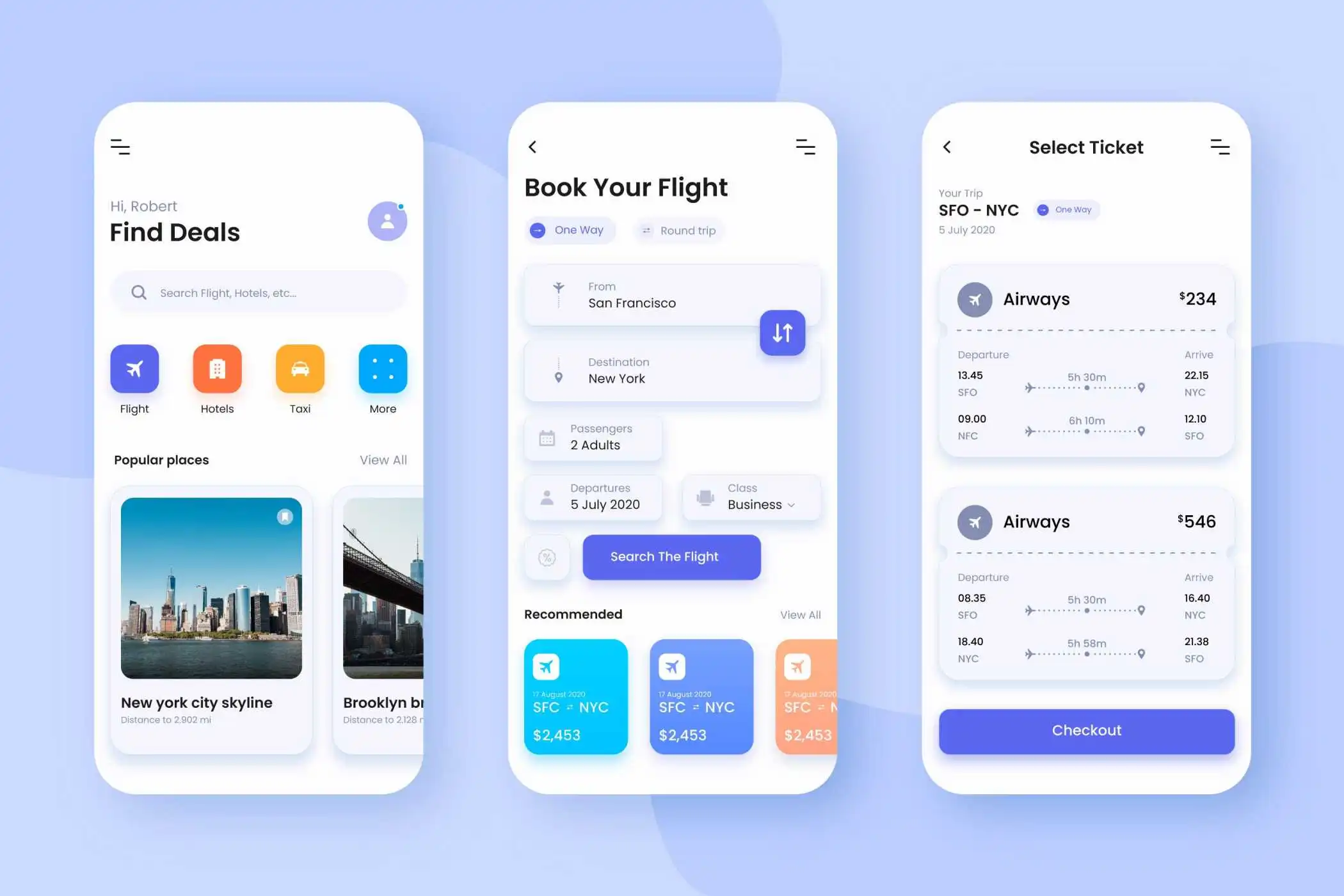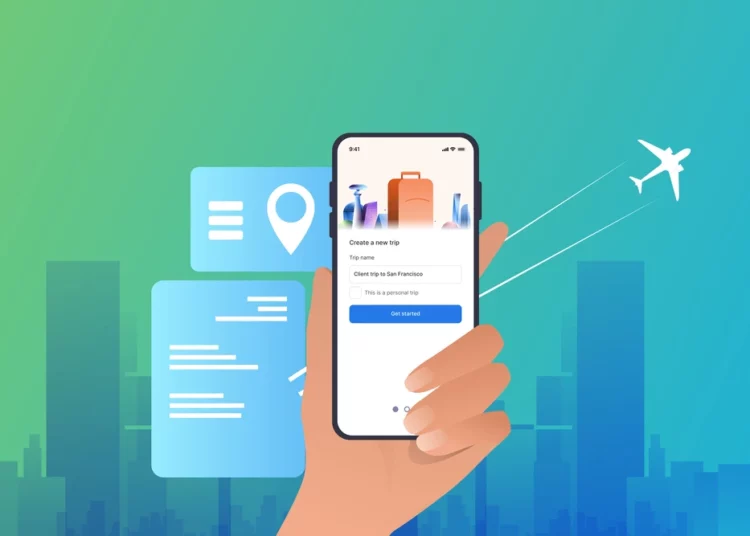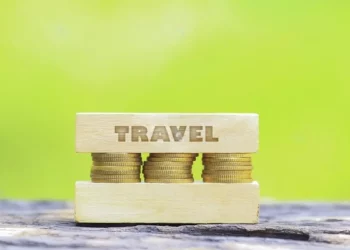Online travel booking trends
Post-pandemic, online corporate travel bookings have seen a ton of changes. Want to know everything there’s to know about it? In this post, we will walk you through some of the major online travel booking trends. Keep reading to know more.
The world forever changed when the Covid-19 pandemic struck us. The rampant spread of coronavirus and subsequent lockdowns greatly impacted business and companies’ operations.
Corporate travel is one aspect of business that faced the brunt of the deadly virus. However, things have become better now. The virus is not as deadly as it used to be, infection rates are decreasing daily, and business travel is returning. After all, a ray of hope is at the end of the pandemic tunnel.
The most recent data suggests that global business travel spending is expected to reach $1.8 trillion by 2027, indicating a significant recovery and growth in the industry post-pandemic. This updated forecast shows a more optimistic outlook compared to earlier predictions, reflecting the industry’s accelerated rebound.
In this post, we have mentioned how travel booking has fared so far, its future, and the new online travel booking trends.
Also, Read: The Business Guide to Corporate Travel Program
Online travel booking industry: How has it fared till now
The industry hit its biggest slump when the pandemic struck and virtually halted all travel. But, thanks to the timely invention of vaccination, the travel industry got out of the deep abyss and is now growing by leaps and bounds. According to Travelport, even by the end of 2021, the travel industry had recovered 50% of its gross revenue.
As of 2024, the momentum continues, with forecasts indicating substantial increases in online travel bookings. Particularly, the Asia-Pacific region, notably China and India, is witnessing rapid expansion, underscoring its potential in the global market.
Evolution of online travel booking engines
Thanks to new-age online booking engines, the online booking process has become more straightforward and accessible over the years. Let us see some of the aspects where online booking engines have grown over the years:
1. User’s location
Online booking engines are now capable of determining the user’s location. This allows you to offer more personalized and targeted deals.
2. Personalisation
Personalization is what all travel companies out there strive for. It allows companies to offer highly customized deals and discounts to customers.
3. Travel meta-search engines
Customers no longer have to search hundreds of sites for the best rates. They can simply use the travel metasearch engine and type out the requirements. The meta-search engine will provide the available options for your search.
4. Reviews
Reviews allow the website to control the user’s purchase journey by enabling users to post reviews.
Also, read: A Guide to Corporate Booking Tool
7 Top key online travel booking trends
Here are some of the key online travel booking trends that must not miss out:
1. Machine learning and artificial intelligence
Machine Learning (ML) and Artificial Intelligence (AI) are the game changers in the online travel booking industry. In tourism, ML uses statistics, images, maps, and texts to predict data accurately. Key decision makers then use the interpretations obtained in the pre-trip, on-trip, and post-trip stages.
AI plays an important role in simplifying travel arrangements and helps in dynamic pricing. Also, artificial intelligence offers personalized choices for the customer.
2. Big data
In general, big data refers to large and diverse data sets. These data sets, when analyzed computationally, can further reveal trends and patterns. The use cases of these data sets can vary for different industries. Big data can be used for predictive and behavioral analysis in the travel industry.
Even though big data gives you a significant advantage in online travel booking, it’s a double-edged sword. That is because the threat of data theft and privacy violation is real in this. Travel companies can tackle this issue by investing in advanced cyber security and data privacy systems.
Also, Read: Benefits of Using a Travel Management Company
 3. Travel apps
3. Travel apps
It’s no secret that mobile travel booking is a major part of online booking methods. A Think With Google Consumer Insights Report says that 79% of mobile travelers completed a booking after researching on their smartphone. As per Online Travel Trends 2023, total online sales peaked at 62.5% on desktops and 37.5% on mobiles. Compared to 2021, we found that mobile has gained a little market share, increasing by 3%.
Almost all online travel booking companies are now focussing on growing their respective travel apps, keeping in mind the shift towards mobile travel booking. Interestingly, 72% of mobile bookings happen within 48 hours of last-minute Google searches that include the words’ tonight’ and ‘today.‘
Following are the factors that contributed to the boost in mobile travel bookings are:
- Self-service check-in
- Contactless payments
- On-trip alerts on mobile apps
- Flexibility in cancellation
Suggested Read: 10 Best Corporate Travel Management Software
4. Conversational platforms
Conversational platforms are of great help for online travel booking. It offers people superior customer satisfaction, personalization, and 24/7 assistance. Moreover, conversational platforms help decrease customer mistakes and save time and effort.
Conversational platforms can be categorized into two types: voice-based and conversational. Siri and Alexa are prominent examples of conversational platforms. Some examples of text-based platforms are WhatsApp, Messenger, WeChat and others.
Voice-activated platforms are yet to be used to their full potential, but experts believe they will significantly impact the online travel booking industry in the future.
5. Virtual reality (VR) and augmented reality (AR)
Virtual reality plays a significant role in healthcare, gaming, engineering, and other augmented fields – the travel industry is no exception. Companies globally have invested heavily in VR and AR to access their capabilities.
Here is how travel companies benefit from using VR:
- Tour operators use VR for selling locations, resorts and activities
- VR is used by hotels to display and market their rooms
- Used in the airline industry for in-flight entertainment
6. Cryptocurrency and blockchain
Both blockchain and cryptocurrency are expected to disrupt the travel space in the future. Some travel companies out there are already accepting cryptocurrencies as forms of payment.
A survey by Travala.com states that 22% of American travelers are using cryptocurrency for travel booking. The company further reported that, in August, 75% of bookings on Travala.com were made using cryptocurrency.
Some of the significant advantages of cryptocurrency are the elimination of foreign exchange fees, the travel budget remaining intact, and the price stability during travel.
Here is a list of all online travel booking platforms that accept cryptocurrency as payment:
- Travala
- Alternative Airlines
- Destinia
- CheapAir
- TravelbyBit
- BTCTrip
- Bitcoin.Travel
7. Environmentally-conscious options
Over the past few years, travelers have become more aware of the current climate crisis. What’s more, governments worldwide are imposing stricter policies to increase sustainability. This growing climate consciousness among travelers has encouraged travel industry players to be more climate-conscious.
Quick Read: What are Business Travel Expenses?
How has Happay revolutionized online travel booking?
Happay Travel is the new age self-booking tool for corporates that can help you save up to 20% on your trip and travel costs. Here are some of the unique features that make Happay India’s favorite T&E automation solution:
- Complete trip management under one platform: You can now book flights and hotel rooms under one platform without having to toggle between multiple screens
- Robust policy engine: Enforce your organizational policy into the Happay travel system easily. This can help improve organizational compliance. What’s more, save up to 8% on your annual expenses
- Octa-recon technology: Happay Travel integrations capture 40+ data points to make reconciliation a breeze
- Smart GST-compliance: On the Happay, the state-wise GST is captured and sent directly to the airlines. What’s more, you can view GST invoices from airlines in one place
- Flexible approvals: Using Happay, set approval for any part of the booking process. On Happay Travel, you can also set up multi-level approval workflows and trigger time-based notifications
- Fare block: Thanks to Happay’s fare block feature, you no longer have to pay higher prices when approval gets delayed. The fare block feature will freeze the ticket as soon as employees make a trip request
- Smart analytics: Access the travel trends and behavior analysis of your entire firm under one single dashboard. The feature offers insights on savings, total spends, top travelers, most traveled to cities, most traveled flights, hotels, number of trips in a month, and so on
Do you want to know more about Happay’s spectacular features? Schedule a demo with us today.
FAQs
Every year the number of online travel bookings is increasing. On average, 143 million online travel bookings are made in a year.
The online industry or travel market comprises various online booking services that are available to consumers to plan their trips. It can be accessed through the internet rather than using a middleman.
Yes, most people prefer to make their travel bookings online since it offers them better options and convenience.







